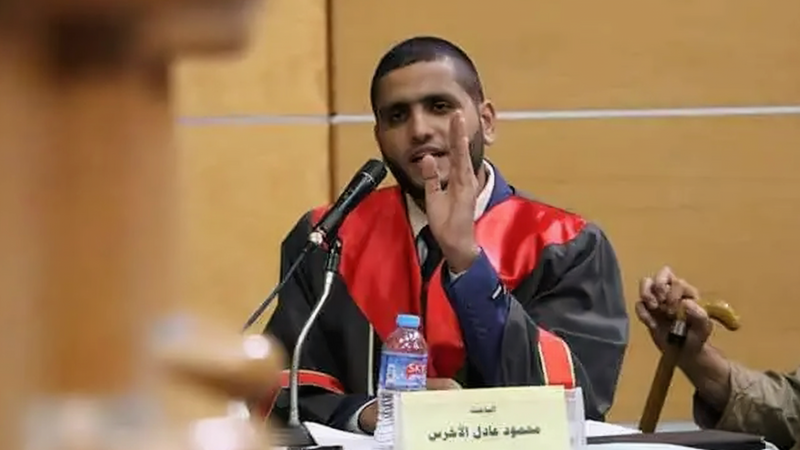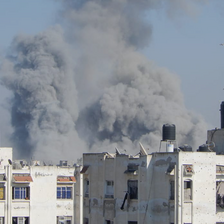The Electronic Intifada 2 May 2025

Mahmoud al-Akhras had just graduated from law school before the genocide began.
Mahmoud al-Akhras, 27, was my friend for 10 years. We studied at the same school in Khan Younis, though he was two years older than me.
Mahmoud was energetic and carried a strong sense of responsibility since he was the eldest of six siblings.
Mahmoud studied law at the Islamic University of Gaza, and two years after he enrolled, I also enrolled in the same major. Mahmoud often helped me with my studies.
Whenever I struggled with a subject, he was the one who guided me – especially before exams.
He would pass on his books to me after completing his courses.
“Pass them on to someone else when you’re done,” he would say.
Before the genocide, I used to visit Mahmoud often.
His father, Abu Mahmoud, would sit with us and tell me stories about Mahmoud’s childhood – how bright he was and how much he helped around the house.
Mahmoud and his father were more like friends or brothers than father and son. Mahmoud often shared his dreams and future plans with his father.
“Mahmoud wants to pursue a master’s degree in law when he finishes his bachelor’s,” Abu Mahmoud told me when I once visited them.
He wanted to become a lawyer just like his aunt. He graduated with a law degree in 2021 and began studying for a master’s degree. He then started training at his aunt’s law office in Khan Younis.
Mahmoud distinguished himself in that role, as those he worked with at the law office would often commend him for how he treated everyone and for his competence in solving thorny issues.
Only two weeks before the genocide, on 24 September 2023, Mahmoud earned his master’s degree and became a lawyer.
Charging points
After the genocide began on 7 October 2023, Israel destroyed key electricity infrastructure and halted fuel supplies, causing a massive shortage of power in the Gaza Strip.
People were required to find alternate power sources for their devices and they headed to designated charging points powered by solar panels and batteries.
In Gaza, we use our phones for many things – to provide light at night, to follow the news, to contact ambulances. We also use them to study, especially now that universities have shifted to online platforms since our campuses and schools have been bombed or turned into shelters.
In the beginning of December 2023, Mahmoud and his family fled from Khan Younis to Rafah.
But when they returned to Khan Younis in May 2024, they found their house destroyed.
They set a tent on the ruins of their house near al-Mawasi, close to where my family and I live.
Mahmoud and I would collect the phones of our family members every morning and head to different, yet nearby, charging points located next to Nasser Medical Complex in Khan Younis.
Sometimes we would run into each other and chat as we waited for the phones to be fully charged, which could take between two to three hours, depending on the phone model.
We would then part ways to bring the charged phones back home and do other tasks, like filling water and going to buy food at the market.
A piece of shrapnel
In early August, Mahmoud and I met by chance and had a short chat.
Mahmoud joked, “What do you think, Hassan – if we send our mukhtars [elders or local headmen] to Netanyahu, do you think they could sort things out and convince him to end the war?”
We laughed and parted ways as usual.
On 20 August 2024, around 4 pm, our building shook violently.
My mother was screaming as my little brother was on his way to buy some necessities.
I ran to the roof of the building and saw the neighboring building covered by black smoke. This is where the charging point was located. People were screaming for an ambulance.
Within less than a minute, I saw ambulances pulling out of Nasser Medical Complex, which is near my house.
But people had already begun transferring the injured onto an animal cart to go to the hospital.
I rushed out to help.
After I finished helping transfer all the injured, I returned home and opened my phone to see the news on the attack.
There were six injured and two martyrs, but then I read a post from Mahmoud’s brother asking for prayers for Mahmoud.
Mahmoud was in the intensive care unit at Nasser.
I called Mahmoud, but there was no answer.
I tried again. And again. The third time was in vain as well.
I called Abu Mahmoud. But there was no answer either.
I grabbed my jacket and rushed out to the hospital to check on my friend.
I arrived and found Abu Mahmoud sitting at the door of the intensive care unit.
When Abu Mahmoud saw me, he stood up and said, “Hassan, Mahmoud was hit by a piece of shrapnel in his head.”
I froze in place. I wished I could hug Mahmoud and cry with him, just like we used to during difficult times.
Mahmoud had been injured in the bombing and was apparently transferred before I arrived at the scene.
His injury was severe, requiring surgical operations. Mahmoud had also lost a significant amount of blood. But as the hospital was facing a shortage of blood supplies – worsened by the Israeli blockade – Mahmoud’s condition became more critical.
I went to visit Mahmoud three days later.
But when I arrived at Nasser, the doctors informed me that they had transferred Mahmoud to Gaza European Hospital east of Khan Younis.
It was the only hospital at the time equipped to treat head injuries as the Israeli forces raided Nasser and destroyed its facilities.
Mahmoud underwent multiple head surgeries and remained unconscious for three weeks.
I wasn’t able to visit him – the Gaza European Hospital was located near the border, and it was too dangerous to reach at the time.
On 6 September 2024, Mahmoud’s brother called and informed me that Mahmoud had succumbed to his injury.
He was buried in a cemetery near his family’s house.
His brother tells me that their father visits the cemetery every day, sitting beside Mahmoud’s grave.
I often go to visit Mahmoud, recite the Quran and speak to him.
I want to cry out sometimes – to tell him how much harder life has become.
I sit there for hours, sharing with him the heaviness of our days.
I once asked Mahmoud as I stood beside his grave, “Do you know that some of our friends have been martyred?”
Mahmoud didn’t answer.
Hassan Ahmad Abu Sitta is a writer and law student in Gaza.




